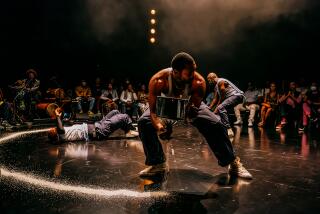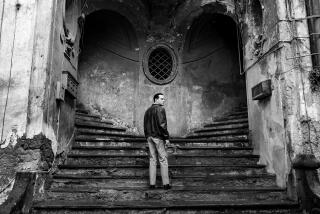‘Rebecca’: A Dazzlingly Dark Visit to Manderley
- Share via
“Last night I dreamt I went to Manderley again.”
--From “Rebecca”
by Daphne du Maurier
PBS goes to Manderley again Sunday night, and the result is a near masterpiece of escapism, a gorgeously mounted, triumphant new two-part “Rebecca” that validates the remaking of at least some movie classics.
First some bad news. Although under-lit in all the right places, this “Masterpiece Theatre” presentation cannot quite equal the gothic spookiness that filming in black and white gave the Oscar-winning “Rebecca” of 1940, which was the first U.S. feature directed by Alfred Hitchcock. And as the stately Manderley’s secrets begin hemorrhaging late in the newer production, so does the plot’s intensity, leaving you to twiddle your thumbs a bit for the last 15 minutes, en route to a tremulous rescue sequence that Arthur Hopcraft’s teleplay regrettably grafts onto the conclusion of Du Maurier’s mystery romance.
Yet otherwise, this latest “Rebecca”--a British, German and WGBH-TV of Boston co-production--is nearly faultless, besides being a much fuller, deeper, richer and more Anglo-atmospheric treatment of Du Maurier’s novel than its predecessors (including an earlier British version aired on PBS in 1980). And fun? With regal sights galore and Diana Rigg swiping nearly every scene she’s in as that stealthy, demented, sexually ambiguous vixen, Mrs. Danvers, it’s hard to imagine a better way to kick back and spend three hours across a couple of Sunday nights.
Even before Manderley emerges somberly from behind the morning mist, gray, damp and foreboding, comes the main story’s courtship in 1927. Fabulously wealthy, aristocratic widower Maxim de Winter (Charles Dance) meets and is enchanted by the soon-to-be second Mrs. de Winter (Emilia Fox) in Monte Carlo. Shy, innocent and half Maxim’s age, she’s companion to the touring American socialite Mrs. Van Hopper (Faye Dunaway), a life in sensible shoes that she swiftly leaves for another in England as Maxim’s wife and new mistress of Manderley.
“Do you like it?” Maxim asks his bride as she first sights the awesome place from afar amid its vast green meadows, terraced lawns and gardens. “It’s yours.”
Not quite, for looming there, among a huge corps of servants in the dank palatial grandeur, is Danvers, the intimidating head housekeeper, just ripped that anyone would dare try to replace the late Rebecca, the first Mrs. de Winter, whom she adored. Her painted lips tightly pursed, her eyes glowering, her face rigid and severe, her voice a glacial whisper, she constantly measures the callow new Mrs. de Winter (whose first name Du Maurier never disclosed) against Maxim’s exquisite first wife, whose memory fires Manderley’s lingering enigmas and its head housekeeper’s passions.
Rebecca is constantly spoken about, but revealed by director Jim O’Brien in flashbacks that flicker briefly and offer only teasing partial glimpses--her eyes, her mouth, her back--leaving us to imagine for ourselves the totality of her oft-described beauty and perfection. Yet her nails claw Maxim from the grave, and her presence lingers powerfully. “I feel her everywhere,” says Danvers, inhaling deeply as if Manderley had been sprayed with Rebecca’s perfume.
*
In addition to being shivery and suspenseful, “Rebecca” is thunderously romantic, its heartthrobs crescendoing like the sea crashing against the rocks below Manderley. And no wonder, for Fox is fresh, sweet and tasty enough to have been poured from a cream pitcher, while Dance wears the cosmopolitan Maxim’s wealth, privilege and silent misery as comfortably as evening clothes.
Just as Judith Anderson’s showy Danvers eclipsed Laurence Olivier and Joan Fontaine in the 1940 movie, though, so does Rigg’s stunning work prevail here, equaling the persuasive wickedness of the murderous mom she played in the PBS miniseries “Mother Love.” Along with Rebecca, it’s Rigg’s shadow as Danvers that darkens Manderley, exploiting the naivete of Maxim’s new wife, her eyes glistening at the memory of her dead employer for whom her obsession is at least partially sexual.
As if quintuplets, she seems to be everywhere, surfacing at odd times to terrify and torment the new Mrs. de Winter, her superior smile indicating the pleasure she takes in it. The housekeeper is such an imposing figure that when Maxim’s timid new wife accidentally shatters a valuable figurine, she scoops up the pieces and, like a child who has misbehaved, hides them rather than face Danvers. You can’t help wondering what life with Mrs. Danvers must have been like for Mr. Danvers.
A dazzling costume ball and startling revelations await in Part 2, as a nearby shipwreck and the emergence of roguish Jack Favell (Jonathan Cake) threaten Manderley’s newlyweds and expose the hidden catacombs of “Rebecca,” one by one. In other words, going to Manderley again is a dream to look forward to.
* “Rebecca” on “Masterpiece Theatre” can be seen Sunday and April 20 at 9 p.m. on KCET-TV Channel 28.
More to Read
Only good movies
Get the Indie Focus newsletter, Mark Olsen's weekly guide to the world of cinema.
You may occasionally receive promotional content from the Los Angeles Times.










